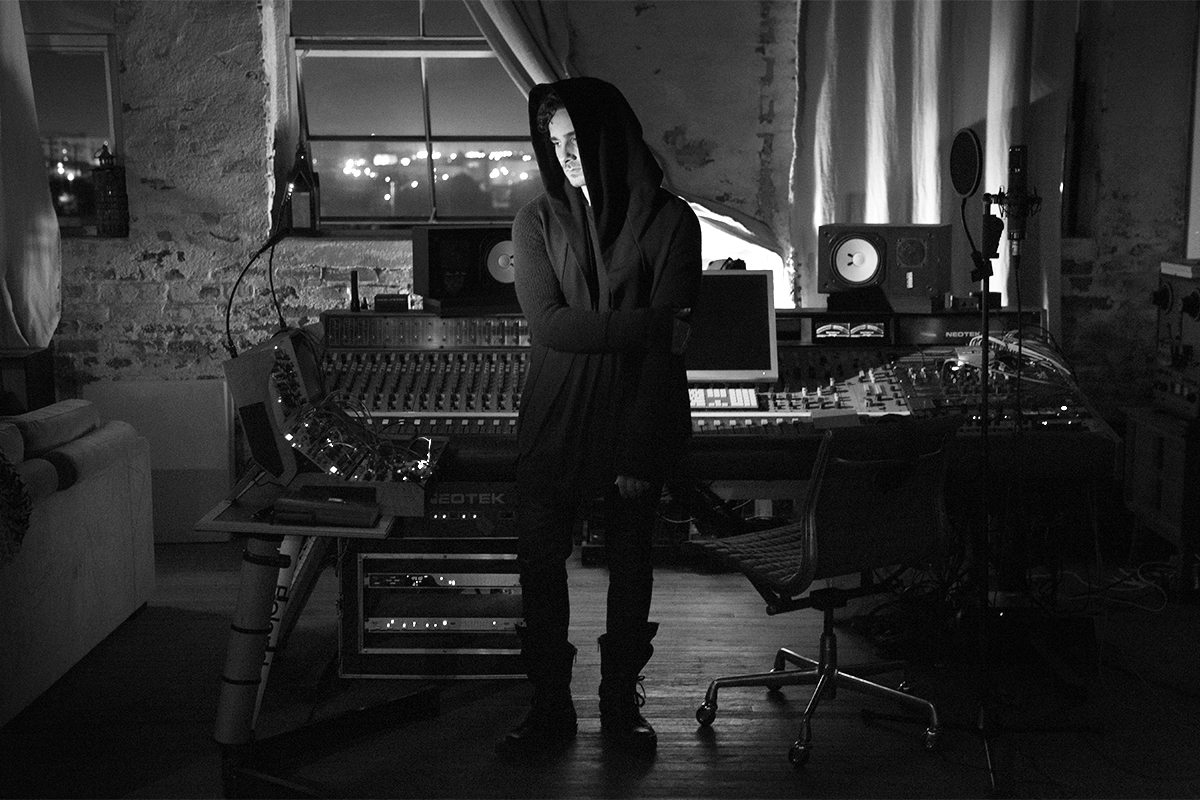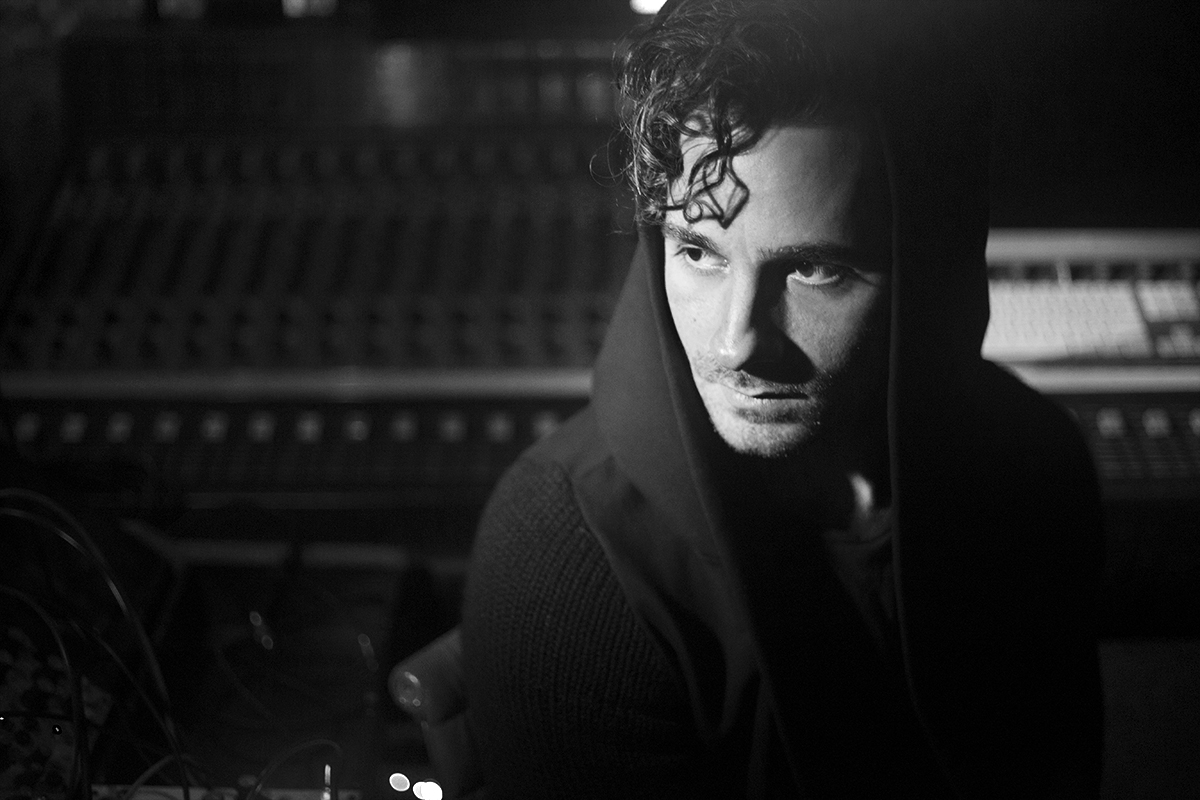“I don’t like distance between myself and anyone who is listening,” explains Telefon Tel Aviv co-founder Joshua Eustis. “Ideally I’d like them to feel like they are right there with me, in it together; that gives me a great deal of comfort.”
That give and take is especially apparent on Eustis’ solo debut as Sons of Magdalene. Available this week through Audraglint, Move to Pain sounds like a murky synth-pop record on the surface but is really the first long overdue step in Eustis figuring out what he wants to do creatively in light of the loss of his longtime collaborator and friend Charlie Cooper in early 2009. Not to mention the passing of Eustis’ father, which happened right after Cooper’s.
“I had a massive, catastrophic meltdown during this very recent post-NIN process of finishing this record,” Eustis says, referring to the sessions that wrapped soon after he was let go from Trent Reznor’s live band. “I was hoping it would go away and I’d never have to think about these songs and what happened at all, but that was folly and I knew it and it almost killed me.”
In the following exclusive, we pair a particularly strong entry in our Needle Exchange mix series with an extensive interview that tackles everything from the grieving process that led up to Sons of Magdalene’s debut LP to the visionary film work of Wong Kar-wai…
1. Belong, Same Places, (Table of the Elements)
2. Rainforest Spiritual Enslavement, Undrinkable Water, (Hospital)
2. Broken English Club, Casual Sex, (Jealous God)
4. Silent Servant, Invocation of Lust, (Hospital)
5. Sons of Magdalene, Takbir, (Unreleased, 2007)
6. Miles, Status Narcissism, (Modern Love)
7. Shifted, Suspended Inside, (Bed of Nails)
8. Porter Ricks, Nautical Dub, (Chain Reaction)
9. Sandwell District/Feed Forward, Immolare, (Sandwell District)
10. Sigha, My Blood is Gold, (Our Circula Sound)
Can you start by telling us how you ended up working with orchestral recordings at Loyola in 2005? How heavily manipulated were the initial Sons of Magdalene tracks and how would you describe their overall vibe as compared to how the Move to Pain album turned out? (Given the orchestral roots of the record and the project’s themes of loss and decay, I’m imagining music that’s a lot like William Basinski—beautiful, but also a bit devastating.)
Charlie and I had been asked to do a remix of Oliver Nelson’s “Stolen Moments” for Impulse! in late ’04. We had agreed that a remix felt a little sacrilegious and had decided to do an arrangement instead, more in keeping with how jazz had always existed as a genre of guys playing covers of each others’ tunes. I had attended the music school at Loyola in New Orleans from ’95-’99, and had a good relationship with the conductor there, Dean Angeles, who had taught me conducting. He would allow us to bring in pieces after they had done their spring concert—for sight-reading exercises—and record it. So out of those sessions, there were a couple of other pieces that were recorded that got turned into very crusty tape loop stuff, pitched down half-speed, pretty typical stuff. I’d say it was heavily indebted to Basinski, although less lush and beautiful and more just a big monophonic blob of pointless 21st century navel-gazing. I released 100 copies of it on a CD-R in 2007, I think, after much ado, but that will be the only time it sees the light of day, I think.
What drew you towards studying the erhu with Bei Xing Xiang, and what were some important lessons—musical and otherwise—you learned from her?
I don’t remember exactly why I started playing. I think I really wanted to play the guqin, but I could neither find one, nor find a teacher in the Chicago area. I found an erhu teacher and an instrument easily enough, though—and as it turns out Bei Xing Xiang is an absolute master of the instrument, having played with Yo Yo Ma and all those Silk Road types. She’s an insane musician. I think I just started to lose an interest in Western instruments in general and it seemed like a fun thing to learn a totally strange instrument and a completely different way of writing and notating music.
Did you already have some experience with the erhu before meeting her? If someone wanted to look up a great example of music that incorporates that instrument in a fresh way, what would you recommend and why?
I had zero experience with this instrument, and I’m still terrible at it to this day. As far as a “fresh” take on it, I’m not aware. All of the music I know for the instrument is traditional, but my ken is admittedly limited. Pretty much any film score by Tan Dun is going to feature the instrument, though.
How often have you used the erhu since 2006? Where has it popped up in your work with Telefon Tel Aviv and Nine Inch Nails? Have you sampled your own playing and manipulated it to the point where it sounds like something entirely different?
I wrote a piece in 2007 called “Quartet for Erhu and Tape” that was originally supposed to be a four part chorale. I recorded it for erhu, played it dreadfully, and played the tape back at half speed and it sounded like mournful foghorns heard while standing on the bottom of the ocean. Basically, not very nice, but interesting. That’s the only time I’ve used it for my own recordings. As far as NIN is concerned, I played it live on “Disappointed,” there’s a string melody that comes in part way through the song. I guess Trent liked that it sounded weak and untrained, so we ran with that.
“I felt like I got dunked on,
and it was totally deserved”
In terms of how Sons of Magdalene evolved, how did you go from experimenting with tape loops to writing more traditional melancholic pop songs? It doesn’t seem like a huge jump to me given the variety of songs Telefon Tel Aviv has explored in the past, but it’s still a noticeable shift.
Well, Sons of Magdalene was originally just my dumping ground for anything that wasn’t TTA or immediately related. There are hours of Sons of Magdalene stuff hiding on hard drives now that will probably never come out of the cave. I think what happened is since the origins of this record were probably going to wind up being TTA stuff, it felt weird and impossible for me to finish it without Charlie’s input. So there it languished for a while. Later, as I was working on it, though, the imagery of the record started to come together, and the story arc of life taking a giant shit and the whole ‘oh woe is me, sky falling on my head’ BS started to clear, I made the decision that I felt was right: not to try to do TTA without Charlie. There are other examples of this in pop music history that I could cite and that are blatantly obvious but we don’t need to name them here. It didn’t feel fair to do another Telefon record so soon without him and especially without his touch to the recording/writing/production.
How much does your love of electro and darker, synth-based music apply to the making of this album? People are going to make obvious comparisons like Depeche Mode, the Pet Shop Boys, etc., but this record reaches much greater creative depths than a simple pastiche of your past influences.
I’d be lying to everyone if I said I didn’t adore Depeche Mode, OMD, Secret Service, Human League, Talk Talk, etc.—all of the stuff from that time period. I also try to devour as much new music as possible. Friends make recommendations to me about something and I’ll get it and then when I get home I’ll see, ‘Oh shit, I had bought the limited color vinyl of this eight months ago and totally forgot what it was or that I had bought it.’ I spend a lot of my money on records because I’m a firm believer in ‘listen to all of it.’ I don’t identify with artists or musicians who cut themselves off entirely from culture to isolate themselves. I don’t think you can make something that matters to other people if you don’t take in culture.
Francesco Clemente crushed me to my face in 2001 when I was at his studio and he said, ‘So what are you listening to right now?’ and I answered, thinking I was so fucking clever, ‘Oh nothing really; I’m trying to immerse myself in this thing I’m working on right now.’ He laughed in my face. His reply was, ‘How can you MAKE music if you do not LISTEN to and LOVE as much other music as possible?’ I felt like I got dunked on, and it was totally deserved.

Shifting to the circumstances around this new album, how old was your father when you learned of his cancer diagnosis? What type of cancer was he diagnosed with, and what stage was he in?
He was 61, and it was bladder cancer at first. Then it spread to the lymph system, and then the liver.
Did your father’s diagnosis bring your family closer together or did it make you feel strangely alone in some ways?
I’ve always had a very, very close family, and that stayed the same. It FELT like we were further apart though, because of geography. There was an instant feeling of ‘oh fuck I gotta get home for a while,’ which wasn’t possible and it was pretty brutal.
Why did you decide to channel the frustration, fear and pain over your father’s illness into a solo project rather than a new Telefon Tel Aviv album? Was it because the wounds felt too fresh, and if you were going to make a record in reaction to it, it needed to remain a personal, singular statement?
Well, a lot of this has to do with timing: My father died right after Charlie. We had cancelled the EU leg of the Immolate tour and I hung out in New Orleans for the month of February trying to figure out what the flying fuck I was going to do with my life—how I could put the pieces back together. We rebooked the tour for May/June and Alfredo Nogueira was going to come with me for that leg. When I was in Berlin in May, I got the second dreaded phone call that I received that year: My father had passed. So by that time, I just wanted to finish touring for Immolate and deal with whatever had been written musically at a later date when I was ready to do so. I went back and forth for years trying to decide whether I should try to make it a Telefon record or a Sons record and I realized that I didn’t think I could do a Telefon record without Charlie so it stuck as Sons. It might have been too ‘meta’ as far as subject matter to be a Telefon record anyway.
Most of the vocals in the Telefon Tel Aviv album that came out right before you started Sons of Magdalene were from guests. Did it take you a while to get comfortable with the idea of hearing your own voice on tape?
Well, I wasn’t actually singing during the Map of What is Effortless period. At least not live. I was working on music with [Belong co-founder] Turk Dietrich and was singing on all of it. That project started in 2001, although we never finished anything that we liked enough to release. Deleted from hard drives. I’ve always liked singing, but I was never really very good at it, so a ton of practice was done in the studio just recording this or that to get used to doing it more often. I still feel very strange whenever I hear my recorded voice to this day, and I don’t think that will ever change.
A lot of the vocals on Move to Pain are buried a bit, or floating out there in the ether. It feels intentional—a way of establishing an atmosphere. Is this the result of you wanting to leave a distance between you and the listener to some degree?
I think the stylized idea behind the vocal production being the way it is mostly just comes from the classical idea of text painting. If I were singing loud and proud, front and center, then the themes would not really be getting the representation that I feel they warrant. It makes more sense to me to do a very literal text painting on something like ‘O, Death’, where the protagonist is on his death bed. Why should he sound strong and powerful? He’s about to die, and having a conversation with Death, so he should sound close to death, I think. All of the imagery on the record is about loss and the occult and the ‘other’, so themes of this nature, I feel, are better dealt with artistically from the standpoint of a physical representation of what that imagery actually is, and not just the purely lyrical content.
Which of the songs were finished in late 2008? When you made a few changes to the record at the end of last year, were these tracks some of the ones that got tweaked?
‘Can’t Won’t Don’t Want To’ and ‘Crows on the Eaves of my Father’s House’ were the first two finished for the record. The version of ‘Crows’ that was finished originally was totally different: a beat-less, ambient thing with some acoustic guitar and the same lyrics. ‘Can’t Won’t Don’t Want To’ just got a new mix with slightly bigger drums. Everything else in that song is the same.
You’ve mentioned Charlie wanting these songs to be the basis of a new Telefon Tel Aviv record. Were you considering that idea yourself, or did you want to keep them as their own separate thing? Was Immolate Yourself being written and recorded at the same time as the early version of Move to Pain? If so, do you think the musical and lyrical themes of each record blended into one another to some degree, at least in spirit since they probably left you in a similar headspace?
Charlie heard those first two songs and got super inspired and shot off a handful of demos to me, then I piled on one or two more, and we had the start of a record. He died literally a month or two after that went down, so I was kinda left holding the bag. I didn’t want to work on his demos without him; that felt inappropriate somehow. I never meant for these songs to be specifically their own thing; they were just stuff I was writing in reaction to my father’s imminent death and a girl I was seeing at the time, and he was into it. So there is definitely some timeline/life experience overlap between where Immolate left off and this one picked up—because this stuff was started and we had a full head of steam on it before Immolate was even released.
Why did you decide to sit on this record in 2010? Was it because the process of supporting Immolate Yourself was painful enough as is, leaving you wanting to step away from your own music entirely?
Partially, yes. I also felt it wasn’t good enough to release, because I was so used to having a collaborator add so much, which left it feeling unfinished and also really self-aggrandizing and overly mopey. Supporting Immolate was extremely trying, emotionally. Having to get up there and sing ‘Helen of Troy’ every night was a singular reexamination of grief and its power. I’d be crying by the end of it every night. And not because of what that song means or ‘oh fuck dude this song is so heavy dude whoa’ but that Charlie wrote the lyrics and sang the recording and I found myself missing him sharply while singing his lyrics.
“A tumor, a black weight of terror stuck to my hip. The only way to get rid of it is to just take a knife and cut it out.”
What made you want to revisit these Sons of Magdalene songs and finally finish them last year? Was it because they simply never left your mind, and probably never would so long as you left them languishing there?
It definitely has to do with the fact that they were eating away at me, and I started to realize that I had to get rid of them or I’d never be free of the grief. Part of me never really dealt fully with Charlie’s passing or my dad’s passing, and this feels like an important step to facing that and moving forward. Not forgetting, but understanding and learning wisdom from it all; not letting it darken everything around me. That’s really what the title Move to Pain is all about—committing to grief and hardship in order to understand it and move through it. Walking away from it doesn’t solve anything.
I also would absolutely have to admit that this record would not even be seeing the light of day if I hadn’t been leaned on pretty heavily by a handful of close friends: Zane Landreth, Turk Dietrich, Mike Jones, Alfredo Nogueira, Brian Foote, Sascha Ring.
Would you say the act of finishing it was both a healing and incredibly painful process because it reopened old wounds?
Yes, both of those things. More painful at first; I had to cut something out, like cutting it out with a hot knife. A tumor, a black weight of terror stuck to my hip. The only way to get rid of it is to just take a knife and cut it out. It hurt, for sure.
What were some influences—records, books, films, etc.—on this record, and your songwriting in general, that won’t be readily apparent upon first listen?
Cormac McCarthy was a big one. I fucking detested Blood Meridian, but I couldn’t put it down. I will NEVER read it again. But I HAD to finish it; the ideas of hopelessness, despair, and brutality were important for me to face. An equally important one for me was A People’s History of the United States of America by Dr. Howard Zinn, who taught my brother at the University of Boston in the ’90s. My brother had been clamoring about it for years and telling me that I was cheating myself by not reading it, and I thought he was being a hippie. Turk Dietrich read it and said it crushed his hope for humanity, so that seemed like the perfect thing for me to dive into, from a literary perspective. I wasn’t ready for the real-life truths inside. It was harrowing.
Film-wise, Wong Kar Wai is and always will be one of the greatest inspirations to me that any artist of any kind can be. 2046 absolutely blew my mind and really hit me right where it matters. He continues to do so. He’s probably the largest outside influence on Sons of Magdalene (aside from generally morbid religious imagery), which started from a statement about Chow Mow Wan at the end of In the Mood for Love:
He remembers those vanished years
as though looking through a dusty windowpane,
the past is something he could see, but not touch.
And everything he sees is blurred and indistinct.
This stanza is the single most directly influential concept to the underlying aesthetic of everything that Sons of Magdalene sounds like. I’ve tried to capture it since.
Can you share some of the stories behind the songs? Like you told FACT ‘Crows…’ is based on a dream. Do you have really vivid dreams a lot, and if so, do you channel them often into your songwriting?
I have vivid dreams all the time. They always get folded into songs. I feel like it’s more fun that way, because the subject matter or the delivery becomes something strange and alien. It isn’t something that I just sat around and thought up; it’s something that was planted in my brain by chemicals firing a certain way, or by some outside force at work. So it feels like I’m not even working on my song. In other ways, it’s also far more terrifying, because I’m actually taking a look at my ego and my subconscious, which are always trying to destroy everything. It’s hard to face that.
‘Hold on Hold Still for a Second’ ties in closely with ‘Crows…’ It was a dream I had shortly after the dream that encapsulated ‘Crows’, in which my then-ex-girlfriend was being relentlessly pursued by something bent on destroying her. The same crows in the dream about my father and the house burning down appeared in this later dream, and I thought it was going to be another warning about being burned alive and whatever that meant or translated to in the real world, but it really was just purely a warning about some other impending doom—not my own, of course. Fredo and I played an early version of this on some of the shows for the fall 2009 leg of the Immolate tour in the US.
‘A Strange Sound’ is obviously written for my mother…
Have you ever experienced lucid dreaming or any other disorienting sleep condition like that?
Consistently. I now have sleep paralysis, but lucid dreaming has happened to me for as long as I can remember. Some see it as a weakness of the mind, or a lack of mental fortitude, and maybe it’s those things, but I try to take that weakness and make it a strength and put it to use in the real world, if I can.
As difficult as it is to write and record without someone as critical as Charlie, do you feel like writing more Telefon Tel Aviv records would keep his legacy alive in some ways?
I feel like if I continue to write music for TTA, it’s at least TRYING to keep his legacy going. But at the same time, I also feel that it’s a disservice. I don’t know that if the tables had been turned, he wouldn’t also move on and do something else. It’s impossible to know. I try to look at any music I make as a testament to his legacy, because where would I be without his friendship and brilliance over all of those years? I’m always wondering what he’d thing of whatever it is that I’m working on.
Have you considered starting another solo project under a completely different name, or trying to find a full-on collaborator like Charlie who can work with you 50/50?
Well, I doubt I’ll start ANOTHER solo project. I’m slow enough as it is. I can’t replace Charlie; I don’t think there’s really anyone who can do what he did for Telefon, so that’s also an exercise in futility. There will be other collaborations, or maybe if TTA comes back, it will be a collaboration in a different kind of way. I really don’t know yet.
Had you dealt with many deaths in your family or among your friends before Charlie’s passing? How has his loss shaped your own life, both positively and negatively, over the past five years?
Well, there was my father right after Charlie. So that was… weird. Previously, my best friend in college had passed away, almost 10 years prior to the date that Charlie passed. A friend from high school had met with an untimely and particularly gruesome passing. My grandfather, with whom I was very close, passed when I was in college. Typical stuff, I guess. I wasn’t really a stranger to death at all but the trifecta of deaths in 2009 was just surreal: my best friend, my father, then John Hughes, who was also like a second father to me. James and John Hughes III had been involved with playing in and releasing records for Telefon since day one.
I don’t know if it shaped it positively except for one basic thing: I always have this feeling when I’m talking to someone, that it might be the last time I speak to them, or hear their voice, or their thoughts, their laugh. It’s caused me to re-prioritize people over everything else. It gave me a huge amount of empathy for everyone else in this world and helped me separate the wheat from the chaff with regards to things in life that really matter and those that totally just aren’t that big of a deal.
Negatively? I’ve always been prone to melancholy and anti-social tendencies, and now I’m a really closeted hermit type. I do my best to break out of this and leave the house and see friends but mostly leaving my flat here means going to the movie by myself to sit in darkness and air conditioning.
What are some songs on the Sons of Magdalene record that directly correlate to your relationship with Charlie?
‘Bitter Soliloquy’, ‘Unfortunate Phone Call’, ‘O Death’, and partially, ‘The Whip’.
Do you already have some new Telefon Tel Aviv material written? If so, did you feel like you couldn’t focus on it fully until your time with Nine Inch Nails was over?
I have a good bit of it but I don’t know if I’ll ever do anything with it. I might just work on Sons from here on out. If this stuff starts becoming something that I don’t hate, then maybe TTA will see the light of day again… As I get older and as things progress and as the music industry continues to implode and take a gigantic shit all over itself, I think more and more of permanently retiring the moniker and moving on. Who the fuck knows, though.
Moving onto your time with Nine Inch Nails, you’ve known Trent Reznor for a while now. Did the two of you really meet randomly at a bar? Was he aware of your music at all back then? Were you a fan of his?
Well, I was 17 years old so there was no music worth playing for him at the time. I extricated him from an unfortunate situation that night and we ended up hanging out all night on the stoop outside Verti Mart, and just talking shit—myself, Trent, and [guitarist] Robin Finck. I was definitely a fan of NIN; The Downward Spiral had just come out, and it left a permanent mark on me with regards to what I thought songs and sounds could be. It’s an undeniably brilliant record.
Why do you think you ended up reconnecting five years later? Did you have a personal and musical connection right off the bat, one that made a collaboration seem inevitable?
I don’t know if it was THAT personal, but he was very cool to me when I was young, and would always answer dumb tech questions and invite me to shows and all that. He got a hold of the first batch of stuff that Charlie and I were working on in ’99, through our friend Allen Jaeger, who had given it to Danny Lohner. After that, we were in Nothing Studios in a matter of days. This would have been late January/early February 2000.
Much has been made of how healthy and positive Trent is these days, especially when compared to the mind state he was supposedly in while making The Fragile. You worked on Things Falling Apart around the time he was still living in New Orleans right? How has your relationship evolved over the years, creatively and personally?
Yeah, that’s exactly the release for which we were making songs. He might have been a little unhinged at the time, more unpredictable, chaotic. Always cool to me, though. After that time period passed, though, I didn’t see him much except here and there and it was kind of a ‘hey how you doing, man?’ We didn’t keep in touch, really. I hadn’t spoken to him or seen him in years until late ’12, when I got the call about NIN.
How long have you been living in LA and how does living there impact your creative process as compared to New Orleans and Chicago? (I assume moving there was as much a part of the purification process as wrapping this record.)
Three years now. Los Angeles isn’t as miserable as Chicago, but it’s more expensive, so it’s a bit of a hustle out here. Thirty-seven years old and still selling rubbers to monks, barely scraping by. That’s inspiration enough: don’t starve, don’t die. Chicago was easier but the weather made me hate being alive. Now I can at least focus on work instead of freezing to death. Moving to LA was also part of the purging, though, as you say: there really wasn’t anything left for me there. I did leave behind a handful of dear friends; people that will mean the world to me until it ends.
How would you describe the process behind Hesitation Marks and what you ended up contributing to it?
I don’t really know much about what went on – I just contributed backing vocals on one song, some editing on another that I think got scrapped. There was a lot of collaboration for that record; Atticus Ross’ role in creating that sort of thing is strong—he’s brilliant. It was pretty nuts to be in the room with Alan Moulder again; I think I’ll always be an absurd fanboy, because he’s influenced my production style so much. Much of how I do things was learned from just listening to what he does over and over again.
What was it like playing with the band on tour, and why did you ultimately leave Nine Inch Nails last year?
Playing in NIN was a once-in-a-lifetime experience, and of course, it was fucking nuts for a guy like me. My Chicago homecoming show was headlining Lollapalooza! I could never have imagined as a kid that I’d get to do something like that. It was comfortable and easy touring; it felt very cush to me. I didn’t leave, though; I was let go. He cut the band down to essentials, and I wasn’t exactly essential to the lineup. I was more of ‘a little something extra’. It was a good ride though.
What are a few key things you’ve taken away from your time with Trent? What about Puscifer?
I learned a ton from the other guys in the band, from Trent, and the guys on the crew, who are all top of their respective games. He’s great at constructive criticism; at least he was with me. He misses NO details. If something wasn’t good enough, he’d let me know in a stern but gentle way, and I’d do my damnedest to fix it. I like to think I’m a better musician now, having been around the caliber of players in that band. I was inspired by him to constantly try to overachieve, and it felt good.
Puscifer is really just a bunch of homies having a blast, and zero pressure. Maynard [James Keenan] has enough stress with his other projects that he wants to keep Puscifer like a playground for ideas, and that’s exactly what it is, thanks in no small part to the absurd amount of work and direction from Mat Mitchell.
Do you plan on releasing any other music under the Sons of Magdalene name or are you retiring it once again now?
There will be a noticeable barrage of pointless releases under the name Sons of Magdalene, and that’s a promise.
Finally, can you tell us a little bit about the mix you made for us?
A lot of this is kind of one side of what I’m listening to right now, and a few things that have been in rotation for years now. A lot of it is music made by friends of mine that inspire me. It’s definitely the darker side of things, from where I am right now.




